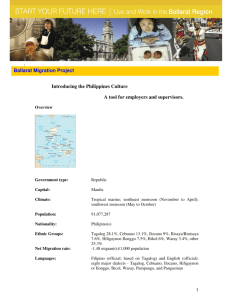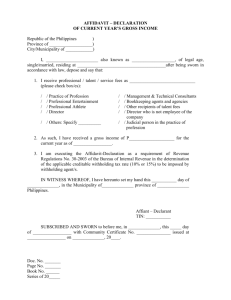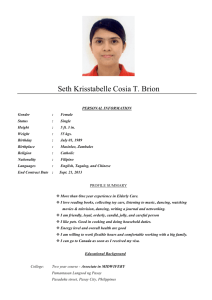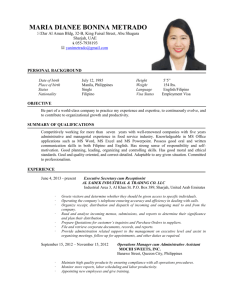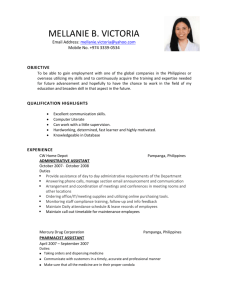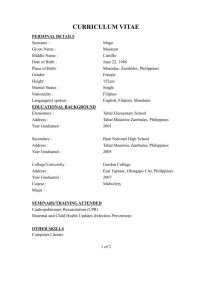THESIS OUTLINE
advertisement
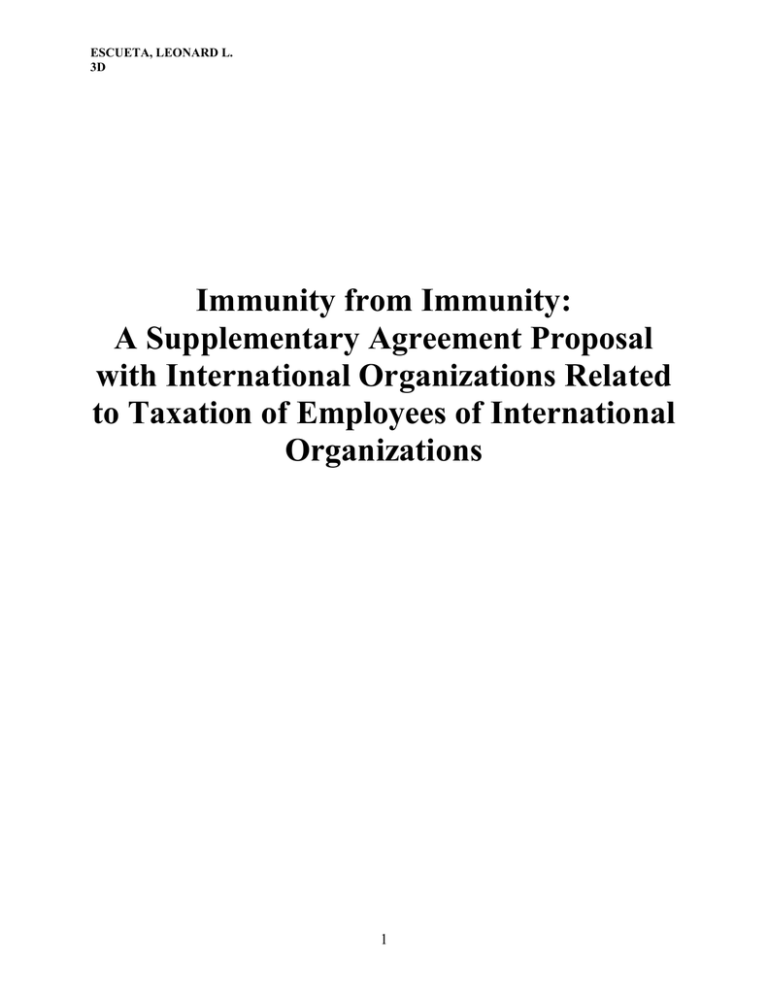
ESCUETA, LEONARD L. 3D Immunity from Immunity: A Supplementary Agreement Proposal with International Organizations Related to Taxation of Employees of International Organizations 1 ESCUETA, LEONARD L. 3D Table of contents Abstract I. Introduction A. Background of the study and statement of the problem B. Definition of terms C. Significance of the study D. Objectives of the study E. Methodology F. Scope and limitation II. Discussion III. Recommendation: Proposed Supplemental Agreement IV. Analysis V. Conclusion VI. Bibliography 2 3-4 5- 7 8 - 13 14 14 15 15 16-17 18-20 20 21 22-23 ESCUETA, LEONARD L. 3D Abstract International Organizations (the “Organization”) are vested with international personality originating from the charter that created them. This enables the Organizations to pursue their legitimate purpose freely without submitting to the sovereign jurisdiction of the State where the Organization is in operation. As a consequence of an international personality, the State also recognizes certain immunities insofar as it concerns the operations of the Organization. Tax exemption is one of the most prominent features of immunity enjoyed by the Organization. The all-encompassing power of the State to tax is rendered inutile by the immunity. Moreover, the tax exemption is absolute, insofar as the operation is concerned, which involved both direct and indirect taxes. In the Philippines, Organizations likewise enjoy almost absolute tax exemption. Nonetheless, the tax exemption of the Organizations has to be properly delineated. The National Internal Revenue Code (“NIRC”) clearly provides that a citizen of the Philippines residing therein is taxable on all income derived from sources within and without the Philippines. The NIRC did not distinguish whether the source of the income was derived from a taxable or an exempt entity. What is being taxed is the income derived by the proper subject, i.e., the citizen and not the source of income, i.e, the Organization. Hence, Filipino employees earning compensation income from the Organization are required to pay taxes. Individuals earning purely compensation income are paying their taxes through their respective employers as an agent of the government by withholding the taxes due thereon from the respective gross salaries of the employees and the same is remitted to the government on a monthly basis. This system effectively negates tax evasion by imposing the responsibility to withhold and remit the taxes to the employers under the penalty of deficiency tax assessments for failure to withhold and certain penalties both civil and criminal. However the NIRC specifically exempts the earnings derived by the employees of internal organizations from withholding tax on wages on the basis of the immunity of the Organization, not due to the exemption of the employee. Based on the foregoing, a legal conflict now exists between the power of the government to tax its subjects earning purely compensation income in a manner other than through the withholding tax system versus the immunity of the Organizations from government compulsion to provide necessary information other than the actual withholding of taxes for proper imposition of tax on Filipino employees working therein. The main proposition is that the government should have the power to legally pursue the employees of the Organization through direct cooperation with the Organization to provide information related to the employment of the Filipino citizens in order for the government to properly administer the taxes on the said employees without necessarily violating the immunity. In addition, it is recommended that the government instrumentalities be empowered to exercise limited jurisdiction over the Organization just so it can reach its proper subjects without necessarily encroaching upon the immunity. This stand may find support in the respective 3 ESCUETA, LEONARD L. 3D charter itself that the Organization shall not be used as a shield to violate the laws of the government. The immunity should not be used as a cloak for tax evasion. A recommendation is also provided in this paper on how to address this conflict essentially through mutual cooperation. It is a cliché that taxation is the lifeblood of the government and it should be collected without unnecessary hindrance. Asian Development Bank (ADB) alone which, incidentally is headquartered in the Philippines employs more than 3,000 Filipino employees and consultants whose earnings have not been taxed since the its establishment in 1966. This thesis suggests a simple and straightforward, yet a very effective means in raising the much needed revenue for the government. If duly implemented, this proposition could generate at least P300 million worth of taxes annually. 4 ESCUETA, LEONARD L. 3D I. Introduction A. Background of the Study and Statement of the Problem Every employer must withhold from compensations paid to its employees. While the employer only serves as an agent of the government to exact the tax from the employee, the law mandatorily imposed the duty to the employers under the penalty of deficiency tax or disallowance of the related expenditure for failure to withhold as if the employer is the one directly liable. The imposition of duty under the pain of a penalty for non compliance effectively ensures the government, through the Bureau of Internal Revenue (BIR) that the employers will appropriately remit the taxes due from its employees. In effect, it significantly reduced the almost impossible duty of the BIR to run after each and every taxpayers earning purely compensation income. To further illustrate, in a large manufacturing corporation employing thousands of employees, the BIR instead of monitoring each individual employees for their tax compliance will only have to monitor the employer and even penalize the latter for any deficiency. However, this system of withholding tax may not be applicable to all employers. There are employers, which, by the very nature of their existence and operation are granted exemptions and immunities from taxes including the duty to withhold. These employers include international organizations and diplomatic offices of other countries with established physical operation in the Philippines. In example, ADB, which has an International Organization status, has a separate agreement1 with the Philippine government. The said agreement explicitly provides privileges including tax exemptions both direct and indirect taxes. The exemption covers the duty to 1 Agreement Between the Asian Development Bank and the Government of the Republic of the Philippines Regarding the Headquarters of the Asian Development Bank, (http://www.adb.org/Documents/Reports/Charter/ADB_Phil_Agreement.pdf) 5 ESCUETA, LEONARD L. 3D withhold and remit taxes from its employees, especially those who are citizens of the Philippines. However, Article XII Section 45(b)2 also provides that exemption from taxation on or in respect of the salaries and emoluments paid by the [ADB] subject to the power of the Government to tax its nationals. Interestingly, the exemption from duty to withholding finds support in the NIRC which exempt wages received from the International Organization as exempt from the coverage of withholding tax.3 Notwithstanding the exemption to withhold, it is clear that the income received by employees who are citizens of the Philippines is subject to income tax. It is the Organization which is exempt, which includes the duty to withhold, and not the employees. Hence, the dilemma: How can the BIR properly impose the tax on these employees when the employer is not duty bound to withhold the taxes. The situation if further aggravated by the BIR’s lack of information on the amount and source of income. While the BIR is not prevented from requesting information from the Organization, the same may be validly rejected on the immunity ground. This difficulty resulted in the improper tax enforcement which may range from improper income declaration to a blatant tax evasion by these employees. To illustrate the possible tax that could have been collected by the BIR, an employer such as ADB employs around 3,000 professional and experienced employees. Assume that each employee, on the average, earns a taxable income of Php 360,000 per year (Php 30,000 per month, not considering the bonus and other taxable benefits). The tax that could have been generated is almost Php 250 million per year. Take note that ADB has been in the Philippines since 1966. 2 Ibid Section 78 (A) (4) of NIRC provides that wage shall not include remuneration paid for services by a Citizen or resident of the Philippines for a foreign government or an international organization 3 6 ESCUETA, LEONARD L. 3D This paper recommends an amendatory provision or a supplemental agreement that will give the BIR, as the official government instrumentality, free access to the employment records including the respective income and other information pertaining only to the Filipino employees. In this manner, the BIR will have a basis to impose the taxes and arrive at a feasible solution in the absence of the withholding tax scheme. The agreement may contain the manner of payment of taxes by the employees, the service of assessment notice, establishment of temporary or permanent BIR office within the organizations’ premises based on the circumstances, etc. On the other hand, the supplemental agreement should be carefully crafted and balanced to avoid undue encroachment upon the exclusive jurisdiction of the organizations over its employees and the foreseeable disruptions of the operations of these organizations. The agreement may contain stipulations such as: limitation on access to information; proper channeling of notice of assessments to its employees; establishment of special period to file and pay their respective income tax returns; granting of tax amnesties and protection from all forms of harassment and threats. Lastly, in order to encourage payment the supplemental agreement may further stipulate that the collections may be channeled to specific government projects consistent with the objectives of these organizations. Of course, this proposal is not expected to gain support specially from the employees since this will materially affect their income. But a firm political will and a mutual cooperation with these organizations will definitely result in benefits that shall outweigh the havoc that it may initially create. 7 ESCUETA, LEONARD L. 3D B. Definition of Terms 1. Employees. The term employee refers to any individual who is the recipient of wages 4. As used in this paper, employees pertain to Filipino employees working with the International Organizations. These employees are resident citizens whose income is taxable derived from sources within and without the Philippines.5 Section 2.78.3 of Revenue Regulations (RR) 02-98 issued on April 17, 1998 by the Bureau of Internal Revenue (BIR) defines employee as: “The term “employee” is an individual performing services under an employer-employee relationship. The term covers all employees, including officers and employees, whether elected or appointed, of the Government of the Philippines, or any political subdivision thereof or any agency or instrumentality. In general, the relationship of the employer and employee exists when the person for whom services were performed has the right to control and direct the individual who performs the services, not only as to the result to be accomplished by the work but also as to the details and means by which the result is accomplished. An employee is subject to the will and control of the employer not only as to what shall be done, but how it shall be done. In this connection, it is not necessary that the employer actually directs or controls the manner in which the services are performed. It is sufficient that he has the right to do so. The right to dismiss an employee is also an important factor indicating that the person possessing that right is an employer. Other factors or characteristics of an employer, which may not be necessarily present in every case, are furnishing the tools and furnishing of a place to work, to the individual who performs the services. In general, an individual is not considered an employee if he is subject to the control or direction of another merely on to the result to be accomplished by the work, and not on to the means and methods for accomplishing the result. In general, individuals who follow an independent trade, business, or profession, in which the offer their services to the public, are not employees. 4 5 Section 78(C) of the NIRC Section 23 (A) of the NIRC 8 ESCUETA, LEONARD L. 3D The measurement, method or designation of compensation is also immaterial if the relationship of employer and employee in fact exists. No distinction is made between classes or grades of employees. Thus superintendents, managers, and others belonging to similar levels are employees. An officer of a corporation is an employee of the corporation. An individual, performing services for a corporation, both as an officer and director, is an employee subject to withholding on compensation, including director's fees.” 2. Employer Section 2.78.4 of RR 02-98 provides that the term employer means any person for whom an individual performs or performed any service, of whatever nature, under an employer-employee relationship. It is not necessary that the services be continuing at the time the wages are paid in order that the status of employer may exist. Thus for purposes of withholding, a person for whom an individual has performed past services and from whom he is still receiving compensation is an "employee". It is the responsibility of the employer to withhold, pay, or refund the tax and furnish the statements required under these Regulations. The term "employer" as defined in (A) and (B) above is intended to determine who is the withholding agent. An employer may be an individual, a corporation, a partnership, a trust, an estate, a jointstock company, an association, or a syndicate, group, pool, joint venture, or other unincorporated organization, group or entity. A trust or estate, rather than the fiduciary acting for or on behalf of the trust or estate, is generally the employer. The term "employer" embraces not only an individual and an organization engaged in trade or business, but it also includes an organization exempt from income tax, such as charitable and religious organizations, clubs, social organizations and societes, as well as the Government of the Philippines, including its agencies, instrumentalities, and political subdivisions. 9 ESCUETA, LEONARD L. 3D 3. Compensation Income Section 2.78.1 (A) of RR 02-98 provides that in general, the term "compensation" means all remuneration for services performed by an employee for his employer under an employeremployee relationship, unless specifically excluded by the NIRC. The name by which the remuneration for services is designated is immaterial. Thus, salaries, wages, emoluments and honoraria, allowances, commissions (e.g. transportation, representation, entertainment and the like); fees including director's fees, if the director is, at the same time, an employee of the employer/corporation; taxable bonuses and fringe benefits except those which are subject to the fringe benefits tax under Sec. 33 of the NIRC; taxable pensions and retirement pay; and other income of a similar nature constitute compensation income. Remuneration for services constitutes compensation even if the relationship of employer and employee does not exist any longer at the time when payment is made between the person in whose employ the services had been performed and the individual who performed them. 4. Government. Government as used in this thesis refers to the Philippine government including its instrumentalities specifically the Bureau of Internal Revenue, the agency imbued with power to administer income taxes. 5. Payroll period Section 78 (B) of the NIRC defines payroll period as a period for which payment of wages is ordinarily made to the employee by his employer. 10 ESCUETA, LEONARD L. 3D 6. Direct Tax Direct taxes are those that are exacted from the very person who, it is intended or desired, should pay them; they are impositions for which a taxpayer is directly liable on the transaction or business he is engaged in.6 Examples are income tax, excise tax, documentary stamp tax. 7. Indirect Tax On the other hand, indirect taxes are those that are demanded, in the first instance, from, or are paid by, one person in the expectation and intention that he can shift the burden to someone else. Stated elsewise, indirect taxes are taxes wherein the liability for the payment of the tax falls on one person but the burden thereof can be shifted or passed on to another person, such as when the tax is imposed upon goods before reaching the consumer who ultimately pays for it. When the seller passes on the tax to his buyer, he, in effect, shifts the tax burden, not the liability to pay it, to the purchaser as part of the purchase price of goods sold or services rendered. 7 Examples are value added tax and withholding tax. 8. Withholding tax In the operation of the withholding tax system, the payee is the taxpayer the person on whom the tax is imposed, while the payor, a separate entity acts no more than an agent of the government for the collection of the tax in order to ensure its payment.8 6 G.R. No. 140230, December 15, 2005, 478 SCRA 61, 71-72 7 Ibid 8 Mamalateo, Victoriano C. Philippine Income Tax First Ed 2004 (p. 379) 11 ESCUETA, LEONARD L. 3D 9. Creditable Withholding Tax. Under the creditable withholding tax system, taxes withheld on certain income payments are intended to equal or at least approximate the tax due of the payee on said income. The income recipient is still required to file an income tax return, as prescribed in Sec. 51 and Sec. 52 of the NIRC, as amended, to report the income and/or pay the difference between the tax withheld and the tax due on the income. Taxes withheld on income payments covered by the expanded withholding tax (referred to in Sec. 2.57.2 of these regulations) and compensation income (referred to in Sec. 2.78 also of these regulations) are creditable in nature. 10. Tax Evasion Tax evasion is a scheme used outside of those lawful means and when availed of, it usually subjects the taxpayer to further or additional civil or criminal liabilities.9 11. Immunities Because they enjoy international personality, they can also be given immunities and privileges of international persons. Their immunities, however, have for basis not sovereignty, as it is for States, but the need for the effective exercise of their function.10 There is no common law doctrine recognizing the immunity of international organizations.11 Their immunities come from the conventional instrument that created them. 12 9 Jose C. Vitug and Ernesto D. Acosta, Tax Law and Jurisprudence 44 (2nd ed., 2000) Bernas, Joaquin. An Introduction to Public International Law. First Edition 2002 (p 315) 11 Id 12 Id 10 12 ESCUETA, LEONARD L. 3D 12. International Organization An international organization is an organization that is set up by treaty among two or more states. It is different from non government organizations (NGOs) which are set up by private persons.13 Although international organizations have personality in international law, their powers and privileges are by no means like those of States.14 13. Supplemental Agreement This paper recommends a supplemental agreement which pertain to the annex to the existing agreement or charter which shall empower the government to enforce tax on its proper subjects. 13 14 Id (p 312) Id (p 314) 13 ESCUETA, LEONARD L. 3D C. Significance of the Study This thesis if implemented will generate steady revenue for the government without difficulty of collection and administration, almost similar to regular corporations who are obliged to withhold from its employees and remit to the BIR. The favorable resolution will augment to the growing budget needs of the government. It will also promote a sense of responsibility to the Filipino employees to take part in the nation building and good governance by paying their correct taxes. Lastly, it will also promote stronger alliance between the government and the Organizations through its mutual cooperation for the achievement of its respective goals. D. Objectives of the Study The objectives of this study are: 1. To establish the legality of the power of the government to impose taxes over its proper subject notwithstanding the immunity of the Organizations; 2. To frame and formalize an agreement supplementing the existing agreements to enable the government and its instrumentalities to legally have access to information that will make it feasible to administer tax while still respecting the immunity of the Organizations; 3. To adopt a long term and sustainable solution to hamper tax evasion without necessarily violating the privilege of Organizations; 4. To strengthen ties and cooperation with the Organizations and government; 5. To create a legally enforceable and administratively feasible manner to increase the revenue collection of the government; and 14 ESCUETA, LEONARD L. 3D 6. To apply the full extent of the law to glaring tax evaders subject to the power of the government to grant tax amnesties and compromise agreements taking into consideration the nature of the position the Filipino employees hold in the Organization. E. Methodology In order to write this thesis, the writer shall conduct research on the Organizations with operations in the Philippines and ascertain the number of Filipino employees working therein. A careful scrutiny of the respective charters and agreements to properly establish the nature of the tax exemptions (i.e, whether it extends to the employees or limited to the organization) would be used in this study. An extensive analysis of the power of the government to tax and the immunity of the Organizations will be adopted so the proposed supplemental agreement will be crafted in a manner that will both enforce the power and respect the immunity. F. Scope and Limitations As to the subjects, this study encompasses all organizations having the status as international organization including but not limited to: 1. Asian Development Bank (ADB) 2. International Rice Research Institute (IRRI) 3. World Bank (WB) 4. United Nations and its Branches and Instrumentalities (UN) 5. International Organization for Migration (IOM). However, the study does not include International Organizations with express provision in their charter extending the tax exemptions to its Filipino employees. This does not intend to be 15 ESCUETA, LEONARD L. 3D applicable to other diplomatic embassies maintained by the other countries as it may be very costly to implement the proposal as it may require the execution of different bilateral agreements for each country. But legally speaking, the same concept may be sustained. This study does not likewise dwell on the taxability of alien employees who are working in the Philippines, absent any express tax exemption. II. Discussion A. International organizations with establishment in the Philippines and employ Filipinos. An analysis of their respective charters focusing on the immunities, tax exemptions and status of its employees as follows: ADB charter and by laws and the agreement between ADB and the Philippines United Nations Charter including its instrumentalities International Organization for Migration charter World Bank charter IRRI charter The applicable portions of the charter pertaining to the tax exemptions shall be duplicated and analyzed to delimit and identify the proper scope of the study. Cases and jurisprudence, if any shall be incorporated as well. B. Immunity from any legal proceeding including jurisprudence Citing some jurisprudence where the immunity is challenged and how the courts resolved it. C. Immunity from taxation including jurisprudence 16 ESCUETA, LEONARD L. 3D Citing jurisprudence on the tax exemption granted to the organization and how was it resolved. D. Income taxation of individuals, a general perspective This part should discuss the basic income taxation in the Philippines for individuals including situs of taxation and some basic principles. Including jurisprudence. E. Tax exemption vs. taxability of income derived by Filipino employees of International Organization This section should establish and discuss that Filipino employees who work with International Organizations are NOT exempt from income taxation considering the discussions in letters A to D. F. Impediment for the administration of taxation on Filipino employees This part will discuss the difficulty of administering tax on the Filipino employees, citing some provisions in the respective agreements including the provision on the NIRC exempting the wages received from the Organizations within the scope of the withholding tax system. 17 ESCUETA, LEONARD L. 3D III. Recommendation: Proposed supplemental agreement A. Access to the employment records by the BIR. Access should be limited only to information as to enable the BIR to ascertain the amount of income earned by the Filipino and compute for the correct income tax of the respective Filipino employees. This should include a detailed explanation on the manner the access will be given. The options should be limited to either a right given to BIR to examine the records of the international organization or a periodic report that the organizations undertake to be submitted to the BIR. B. Establishment of temporary or permanent BIR office within the organizations’ premises. This should clearly establish the physical boundary within which the BIR should have physical access over the premises so as to ensure that the BIR will not unduly harass or threaten Filipino employees C. Allowance of service of assessment notices to Filipino employees in the organizations’ premises This should also include the proposed manner of servicing assessments through proper channels within the organization in order not to disrupt the operations. D. Securing necessary tax clearance with the BIR prior to release of last pay due to retirement or resignation 18 ESCUETA, LEONARD L. 3D The BIR would essentially have a lien over the last pay of the resignee/retiree. This section should also discuss possible issues on encroachment on the jurisdiction and immunity of the organization. E. Administration of taxes prescribing the manner and date of filing and the mode of payment, etc. This portion shall provide a proposal for a special deadline and mode of payment so as not to disrupt the operation of the organization, to ease the burden on the Filipino employee and to harmonize with the organizations timing of paying salaries to Filipino employees. F. Tax amnesty and/or compromise agreement for non payment of tax in the previous taxable periods This section should set a waiver of the 10-year prescriptive period of the BIR to assess as a concession in exchange for a fixed amount as a form of compromise taking into consideration the adverse impact to the operations of the organizations and to encourage tax compliance to Filipino employees prospectively. G. Proposed joint effort of the executive and legislative branch Power of taxation is inherently vested in Congress. But the power to enter into international agreement rests in the Executive department. Hence, tax matters embedded in an international agreement should originate from which department in order to be binding? The suggestion is a joint effort respecting the powers and competencies of each branch of the government. 19 ESCUETA, LEONARD L. 3D H. Securing approval from the respective organizations This includes preliminary discussions with the representatives of the organizations. I. Creation of a permanent group in the BIR to handle this matter This is not part of the supplemental agreement but would be necessary should the proposal be implemented. This may be handled internally within the government. IV. Analysis A. Feasibility of the supplemental agreement This portion should provide a deep analysis of the advantages and disadvantages of the proposal in order to weigh the likelihood that the same may be acceptable to respective organizations. B. Doctrine of uniformity and equality of taxation To provide an analysis whether the said proposal is consistent with the equality and uniformity of taxation doctrine as embodied in the constitution. C. An estimation of the possible inflow of revenue for the government This section shall discuss the basic estimation of tax revenue that the government may get from this proposal and the possible costs to be incurred. 20 ESCUETA, LEONARD L. 3D V. Conclusion Tax is the lifeblood of the government and should be collected without unnecessary hindrance. International organizations, being clothed with immunities proved to be a strong force against imposition of the tax on its rightful subjects: the Filipino employees working therewith. By piercing through that shield of immunity by mutual cooperation through a supplemental agreement, as discussed, the government can penetrate and legally ascertain the taxes due which may be used to augment the finances for our government. While this proposition may appear to be a difficult obstacle to hurdle, a strong political will coupled with a good cause may be enough to make it through the finish line with flying colors. It is high time that these professionals comply with their civic duties to pay their taxes and not be left unnoticed indefinitely. Finally, not only that this will bring revenue to the government, this proposition will also balance the inequalities of life that tax has as one of its purpose and promote patriotism and sense of responsibility for the country. 21 ESCUETA, LEONARD L. 3D VI. Bibliography (Note: Some jurisprudence do not have their SCRA citation yet, temporarily used GR nos.) Bernas, Joaquin. The 1987 Constitution of the Republic of the Philippines: A Commentary. 2003 Edition Bernas, Joaquin. An Introduction to Public International Law. First Edition 2002 Acosta, Ernesto and Vitug, Jose. Tax Law and Jurisprudence. Third Edition 2006 Mamalateo, Victorino. Philippines Income Tax. First Edition 2004 Presidential Decree No. 1620: Granting To The International Rice Research Institute (IRRI) The Status, Prerogatives, Privileges And Immunities Of An International Organization Agreement Between the Asian Development Bank and the Government of the Republic of the Philippines Regarding the Headquarters of the Asian Development Bank (http://www.adb.org/Documents/Reports/Charter/ADB_Phil_Agreement.pdf) Usaffe Veterans Association, Inc. vs. Treasurer of the Philippines, et. al., 105 Phil. 1030 World Health Organization and Dr. Leonce Verstuyft v. Hon. Benjamin Aquino, etc., et al., 48 SCRA 242 United Nations Charter (http://www.un.org/en/documents/charter/index.shtml) Philippine Acetylene Company versus Commissioner of Internal Revenue, et al., 127 Phil. 461 Southeast Asian Fisheries Development Center vs. Acosta, et. al., G.R. Nos. 97468-70 September 2, 1993 Commissioner Of Internal Revenue vs. John Gotamco & Sons, Inc. And The Court Of Tax Appeals. G.R. No. L-31092 February 27, 1987 Eldepio Lasco, et. al., vs. United Nations Revolving Fund For Natural Resources Exploration (UNRFNRE), G.R. Nos. 109095-109107 February 23, 1995 Ernesto L. Callado, Petitioner, Vs. International Rice Research Institute, Respondent. G.R. No. 106483 May 22, 1995 Kapisanan Ng Manggagawa At TAC sa IRRI-Organized Labor Association In Line Industries And Agriculture vs. Secretary Of Labor And Employment and 22 ESCUETA, LEONARD L. 3D International Rice Research Institute, Inc., 190 SCRA 130 Department Of Foreign Affairs vs. National Labor Relations Commission. G.R. No. 113191 September 18, 1996 Davao Gulf Lumber Corporation v. Commissioner of Internal Revenue, et al., 293 SCRA 76, 88 Commissioner of Internal Revenue v. Acosta, etc.,G. R. No. 154068, August 3, 2007 Southern Cross Cement Corporation v. Cement Manufacturers Association of the Philippines, et al., G. R. No. 158540, August 3, 2005 Lutz v. Araneta, 98 Phil. 148 Commissioner of Internal Revenue v. Central Luzon Drug Corporation, G.R. No. 159647, April 16, 2005 Commissioner of Internal Revenue, et al., v. Santos, et al., 277 SCRA 617 Banas, Jr. v. Court of Appeals, et al., G.R. No. 102967, February 10, 2000 People v. Castaneda, G.R. No. L-46881, September 15, 1988 Commissioner of Internal Revenue v. The Estate of Benigno P. Toda, Jr., , etc., G. R. No. 147188, September 14, 2004 23
